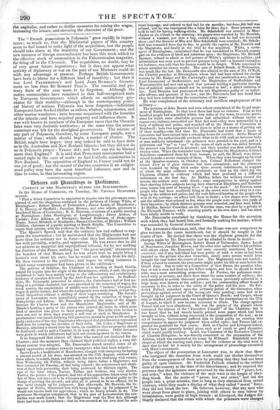The "French possessions in Polynesia" grow rapidly in impor- tance;
so much so, that the Ministerial papers of this country seem to feel bound to make light of the acquisition, lest the people should take alarm at the inactivity of our Government ; and the new instance of foreign encroachment has been this week added to the effective stock of ammunition in the Palmerstonian magazine, for firing off in the Chronicle. The acquisition, no doubt, may be of very great future importance ; but it does not appear what activity of diplomacy or war on the part of our Ministers could do with any advantage at present. Perhaps British Governments have been to blame for a different kind of inactivity ; but then it was Lord PALMERSTON'S and Lord JOHN RUSSELL'S Govern- ment no less than Sir ROBERT PEEL'S. The essential and pri- mary facts of the case seem to be forgotten. Although the native communities have remained in that half-recognized state by European Governments which affords no satisfactory gua- rantee for their stability—although in the contemporary politi- cal history of nations Polynesia has been forgotten—individual Europeans have flocked thither as sailors, whalers, missionaries, and other marine wanderers ; have become acquainted with the beauties of the islands ; and have acquired property and influence there. It was well known to numbers of the European races that the Oceanic Isles were very desirable territories ; at the same time the utmost contempt was felt for the aboriginal governments. The seizure of any part of Polynesia, therefore, by some European people, was a matter of time; which should begin, a matter of chance. The British might have begun : they may indeed be said to have done so in the Australian and New Zealand Islands ; but they did not do so in Polynesia proper : France did ; and how can she be blamed more than England ? It is said that Protestant missionaries had a vested right in the cure of souls : so had Catholic missionaries in New Zealand. The opposition of England to France could not do one jot of good ; but the accord of the two countries in an enlight- ened policy may have the most beneficial influence, now and in time to come, in that interesting region.


























 Previous page
Previous page